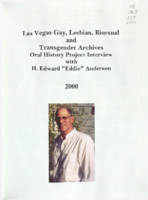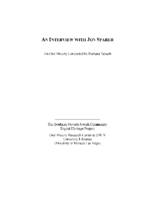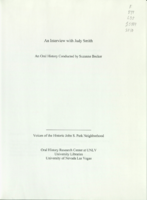Search the Special Collections and Archives Portal
Search Results

Transcript of interview with David Wasserman by Barbara Tabach, October 21, 2016
Date
Archival Collection
Description
For nearly two decades between 1950 and 1970, only one dentist of Jewish ancestry was known to be licensed to practice in Nevada. That was Dr. Joe Chenin. Finally, in 1971, the steadfast and easy mannered Dr. David R. Wasserman (1944 - ) broke through the barrier to become the second Jewish dentist serving the Las Vegas community. Over the following years, Dr. Wasserman built a sizeable following and immersed himself in the Jewish community of Las Vegas. Among his achievements is his participation and leadership in the formation of Las Vegas’ first Reform Jewish synagogue, Congregation Ner Tamid. He also would be active in the Jewish Federation. In 1992, as the HIV-AIDS epidemic affected dental offices throughout the nation, Dr. Wasserman saw an opportunity to get ahead of the infection. With the help of his wife Juanita Davis-Wasserman and his father-in-law Warren Davis, he developed, patented, manufactured and distributed a disposable tip for a treatment instrument commonly found in dental offices called a tri-syringe. This disposable tip brought sanitary options and great financial fortune to Dr. Wasserman and his family. In this oral history, Dr. Wasserman reflects on his joy of living in Las Vegas. He is a highly regarded dentist and leader in the Jewish community.
Text

Transcript of interview with Walter Dane by Ann Clark, March 11, 1978
Date
Archival Collection
Description
On March 11, 1978, Ann K. Clark interviewed her step grandfather, tire repairman Walter Dane, (born August 10th, 1914 in West Barnett, Vermont) in her, the interviewer’s, home in North Las Vegas. Also present during the interview is the interviewer’s mother, Marie Dane. Walter relocated to Indian Springs in 1930 before settling in Las Vegas in 1943. In 1968 he moved to Utah, where he resided at the time of this interview. Well-traveled, Walter discusses his many moves over the years. Ultimately, this interview covers the growth and development of the Las Vegas and Indian Springs areas.
Text

Transcript of interview with Edward "Eddie" Anderson by Dennis McBride, October 11-14, 2000
Date
Archival Collection
Description
Dennis McBride interviews Eddie Anderson (born 1946) about his role in advocating for LGBT rights, specifically his participation in the various political and social movements during previous decades. The interview begins with a discussion of Anderson’s background, including his experiences growing up in children’s homes and living with his grandparents. Anderson mentions marching with his grandparents for both workers’ and women’s rights as some of his first political involvements. Anderson also discusses his original aspirations for becoming a priest as well as his memories of meeting President John F. Kennedy during a visit to his high school when Anderson was student body president. Anderson then discusses travelling to the South, specifically in Selma, Alabama, during one summer while in high school in order to help register Black voters. Anderson then discusses his friendship with Nevada Senator Bill Raggio and his wife, and his joining of the U.S. Navy, where he met President Ri
Text

Myron Martin and Don Snyder interviews, November 30, 2017, December 06, 2017, and March 08, 2018: transcript
Date
Archival Collection
Description
Part 1: Interviewed by Stefani Evans. Myron G. Martin, President and CEO, and Donald D. Snyder, Chairman of the Board of Directors, share their memories of the founding of The Smith Center for the Performing Arts from the first non-for-profit foundation formed in 1996. The second iteration led by Snyder in 1999 brought in Martin--former Director of UNLV Performing Arts Center--and created a sustainable business plan for a center for the performing arts that would be accessible geographically and culturally for all segments of Nevada society. Here, Martin and Snyder recall how land, funding, and legislation for The Smith Center depended on the ""power of the project"" and the Snyder-Martin team's ability to overcome skeptics in the public, the Nevada Legislature, the Clark County Commission, the Las Vegas City Council, and the Don Reynolds Foundation. Martin and Snyder satisfied the various requirements for each organization and earned unanimous approval at each stop--in fact, the $50 million donation to The Smith Center was the largest the Don Reynolds Foundation had ever granted largest. That the approvals came on three consecutive days from competing municipal jurisdictions makes the accomplishment even sweeter. Subjects: Las Vegas, NV; Cultural center; Performing arts; The Smith Center for the Performing Arts; The Smith Center; Not-for-profit;; Nevada Legislature; Clark County Commission; Las Vegas City Council; The Don Reynolds Foundation; Fundraising; Planning; Endowment; Part 2: Interviewed by Stefani Evans. Martin, who was the youngest of three boys raised in suburban Houston, Texas, likes to say that in college at the University of North Texas he played for the Atlanta Braves and the Texas Rangers. So he did--as the organist. He earned a Bachelors of Music in piano, organ, and voice and an MBA from Golden Gate University. He came to Las Vegas after a fifteen-year career with the Baldwin Piano Company as executive director of the Liberace Foundation; he later became president of UNLV?s Performing Arts Center and in 1999 he became president of the Las Vegas Performing Arts Center Foundation. Here, Martin and Snyder recall the process whereby they hired architect David Schwarz of Washington, DC, to create The Smith Center's ""timeless, elegant"" look; creating a ""shared vocabulary"" by visiting 14 performing venues in 5 European countries; the City of Las Vegas's RFP that resulted in hiring Whiting-Turner Contracting Company; the exterior art/artists, significance of the bell tower, Founding Fifty(seven), and the ability of the theater to adapt from staging The Book of Mormon to staging a community funeral for two slain police officers. Subjects: The Smith Center; The Smith Center for the Performing Arts; Architecture; Fundraising; Acoustics; Public private partnerships; Request for proposals; Whiting-Turner; Theater Projects Group; vocabulary; Part 3: Interviewed by Stefani Evans. Author Jack Sheehan, joining this third session on The Smith Center in his role as Don Snyder's biographer, explains the way he envisions the place of The Smith Center in the larger context of Las Vegas. Martin and Snyder provide names for the group that grew out of the Call to Action meeting and founded the original Las Vegas Performing Arts Foundation. They share anecdotes of a 2005 trip, wherein they were joined by Las Vegas City Councilman Lawrence Weekly, City of Las Vegas Mayor Oscar Goodman, and consultant to the City of Las Vegas Dan Van Epp to visit City Place and the Kravis Center for Performing Arts in West Palm Beach as an example of a place where a performing arts center was a catalyst for revitalization in an area of underused and underutilized urban land. They discuss opening night, March 10, 2012, /From Dust To Dreams: Opening Night at the Smith Center For The Performing Arts/, which was produced broadcast live on national Public Broadcasting System (PBS) television stations, produced by George Stevens Jr. and directed and produced by Michael Stevens for The Stevens Company; hosted by Neil Patrick Harris; and featuring Jennifer Hudson, Willie Nelson, Merle Haggard, Emmylou Harris, Martina McBride, Carole King, Arturo Sandoval, Joshua Bell, Mavis Staples, Pat Monahan; American Ballet Theater dancers Marcello Gomes and Luciana Paris; also Broadway performers Brian Stokes Mitchell, Laura Osnes, Cheyenne Jackson, Sherie Rene Scott, Montego Glover, and Benjamin Walker. Martin describes how provisions of Nevada SB235--introduced March 6, 2017, signed into law by Governor Bob Sandoval, and became effective October 1, 2017--for the regulation of ticket sales to an athletic contest or live entertainment event affect The Smith Center ticket sales. They talk of providing 3,600 good construction jobs during the recession, of Discovery Childrens Museum, of future development plans for the entire 61-acre Symphony Park parcel, and of a second capital campaign to increase the endowment to $100 million to enable The Smith Center to be economically sustainable.
Text

Transcript of interview with Norma Morrow Zuckerman by Barbara Tabach, April 18, 2016 & March 13, 2017
Date
Archival Collection
Description
Norma Morrow Zuckerman is the driving force behind the Jewish Repertory Theatre of Nevada [JRTN], an organization she co-founded with Charlene Sher in 2010. The endeavor coincided with Norma’s pursuit of an MFA at UNLV a couple of years prior. With the commitment to her studies and to bring professional Jewish theatrical performances to Las Vegas, her energetic personality intensified. In 2007, she performed in The Diary of Anne Frank and noted the audience was supporting Jewish Family Services Agency. Norma could sense the community’s eagerness for professional theatre and she was just the one to deliver it. Over the following years, JRTN produced an array of Jewish-themed and acted plays. Since then she tries to bring The Diary of Anne Frank to the stage annually and finds partners to bring 1400 eighth graders to the performance. By 2012, her commute between Los Angeles, where she is a garment designer/manufacturer with her husband Eugene, and Las Vegas had become routine and her passion for professional theatre in Las Vegas increased. This was the year that The Smith Center for Performing Arts opened. The first theatrical production was Golda’s Balcony, a one-woman drama starring Tovah Feldshuh. It was the spectacular co-promotion by Norma’s JRTN and the Smith Center. Norma was smitten with the theatre from a young age and studied with some of the best acting coaches—Milton Kastelas, Stella Adler, Wynn Handman. In this oral history she recalls the people who have helped her, the performances that have charmed audiences and the value of live theatre.
Text

Transcript of interview with Jon Sparer by Barbara Tabach, March 4, 2015
Date
Archival Collection
Description
In this interview, Jon Sparer discusses his involvement as the architect of Congregation Ner Tamid's synagogue in Green Valley. He explains details of the building including the concrete tilt-up form, glass windows and the incorporation of quotes throughout the building. Sparer also discusses his involvement with the Gay and Lesbian Community Center of Southern Nevada (The Center) as a board member.
According to architect Jon Sparer, when he moved to Las Vegas in the early 1980s, the art of the deal was still based on a "handshake." It was just after the infamous MGM fire and Jon went to work for Rissman and Rissman. He later worked for Marnell Corrao Associates until 2001, and then as a principal in his own firm. He is now retired. While honing his design skills with the exciting transformation of the Strip into a world-class destination, Jon also became an active contributor to the Las Vegas community. Among his most notable experiences was being on the search committee for a new location for the fast growing Congregation Ner Tamid and then the architectural design for the synagogue's location in Henderson. It was a unique experience and Jon tells how he approached each aspect of the religious facility and how it would provide a memorable setting for life experiences. Jon has been involved with Jewish Family Services and the Anti-Defamation League (ADL). In addition, Jon along with his husband John Klai have been instrumental in the LGBTQ community and the opening of the Gay and Lesbian Community Center of Southern Nevada [The Center]. In this interview, he also talks about the significance of The Center/ and its success in working with the Clark County Health District, as well as providing a user-friendly experience for all who visit The Center and the Bronze Cafe located there.
Text

Transcript of interview with Judy Smith by Suzanne Becker, November 22, 2008
Date
Archival Collection
Description
Judy Smith was a teenager when her family relocated from Barstow, CA to Las Vegas in 1958. It was a wide open setting, an ideal location for riding her horse. It was also an era of growth as the city became a gambling destination and the Strip became dotted with early casinos and hotels. Judy attended Las Vegas High School, worked for the Las Vegas Sun and earned a scholarship to UNR. By 1967, she was married and moving back to Vegas with her young family. They chose the John S. Park Neighborhood as the place to call home. For Judy living in John S. Park is about a "sense of place" and "a sense of timelessness." She describer the evolution of the neighborhood and the greater Las Vegas community from the pioneers to the contemporary leaders. In 2006, Judy's home was gutted by a fire. Her life was saved by an observant neighbor. She could have relocated at the time, but chose not to move from the area that she has called home for over 40 years.
Text

Interview with Stuart C. Black, January 18, 2005
Date
Archival Collection
Description
Text

Interview with William Byron Beam, January 20, 2005
Date
Archival Collection
Description
Text

Interview with Nick C. Aquilina, April 6, 2004
Date
Archival Collection
Description
Text
